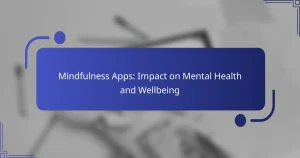Integrative health coaching offers personalized support for achieving health goals and enhancing well-being. Key strategies include personalized goal setting, active listening, and holistic assessments. Technology integration, such as mobile apps and telehealth platforms, improves communication and resource accessibility. This approach emphasizes sustainable lifestyle changes and long-term health management, addressing challenges like client adherence and communication barriers.

What strategies are effective in integrative health coaching?
Effective strategies in integrative health coaching include personalized goal setting, active listening, and holistic assessments. These approaches foster client engagement and accountability. Technology integration, such as mobile apps for tracking progress, enhances communication and resource accessibility. Utilizing evidence-based practices ensures the coaching is grounded in reliable data, promoting positive health outcomes.
How do personalized assessments shape coaching approaches?
Personalized assessments significantly enhance coaching approaches by tailoring strategies to individual needs. This customization fosters deeper engagement and more effective outcomes in integrative health coaching. Personalized assessments identify specific health goals, preferences, and barriers, allowing coaches to create targeted action plans. Technology integration, such as health tracking apps, further refines these assessments, providing real-time data that informs coaching strategies. As a result, clients experience a more holistic and responsive coaching process that aligns with their unique health journeys.
Which behavioral change techniques are commonly used?
Integrative health coaching commonly uses techniques such as goal setting, self-monitoring, and motivational interviewing. These strategies facilitate behavioral change by fostering personal accountability and enhancing motivation. Additionally, techniques like cognitive restructuring and action planning are employed to help clients overcome barriers and achieve their health objectives.
What role does goal setting play in coaching success?
Goal setting is crucial in coaching success as it provides direction and motivation. Clear goals enhance accountability and focus for both coaches and clients. This structured approach fosters measurable progress and encourages personal growth. Effective goal-setting strategies can increase client engagement and satisfaction, ultimately leading to better health outcomes.
How can mindfulness practices enhance coaching outcomes?
Mindfulness practices significantly enhance coaching outcomes by promoting self-awareness and emotional regulation. These practices help clients focus on the present, reducing anxiety and improving decision-making. Research indicates that integrating mindfulness into coaching can lead to improved goal attainment and personal growth. Additionally, mindfulness fosters a supportive coaching environment, enhancing trust and communication between coach and client.

What benefits does integrative health coaching offer?
Integrative health coaching offers personalized support for achieving health goals, enhancing well-being, and fostering sustainable lifestyle changes. Benefits include improved motivation, accountability, and access to holistic strategies that integrate physical, emotional, and nutritional health. Studies show clients often experience reduced stress and increased life satisfaction. Integrative health coaching uniquely tailors approaches to individual needs, making it an effective tool for long-term health management.
How does it improve overall well-being and quality of life?
Integrative health coaching significantly enhances overall well-being and quality of life by promoting holistic health strategies. It empowers individuals to set personal health goals, fostering self-awareness and accountability. Clients often report improved mental clarity, reduced stress, and enhanced physical health through tailored coaching techniques. As a result, they experience greater life satisfaction and resilience against health challenges.
What impact does it have on chronic disease management?
Integrative health coaching significantly enhances chronic disease management by promoting personalized strategies and fostering patient engagement. It empowers individuals to adopt healthier lifestyles, improving adherence to treatment plans. Studies show that coaching can lead to reductions in symptoms and improved health outcomes, such as a 30% decrease in hospitalizations among participants. Additionally, technology integration facilitates ongoing support and monitoring, enabling timely interventions. This holistic approach addresses both physical and emotional aspects of chronic diseases, ultimately enhancing quality of life.
How can it enhance mental health and emotional resilience?
Integrative health coaching enhances mental health and emotional resilience through personalized strategies and support. It promotes self-awareness, encourages positive behavior changes, and fosters coping skills. Clients learn to manage stress effectively, leading to improved emotional regulation. Additionally, technology integration, such as apps for mindfulness and progress tracking, provides ongoing support, reinforcing resilience-building practices. This holistic approach empowers individuals to navigate challenges and maintain mental well-being.
What are the long-term health outcomes associated with coaching?
Integrative health coaching leads to improved long-term health outcomes, including enhanced wellness, better chronic disease management, and increased patient engagement. Research indicates that individuals who undergo coaching report higher satisfaction with their health and lifestyle changes. These outcomes stem from personalized strategies that address specific health goals, fostering accountability and sustained behavior change. Technology integration further supports these efforts by providing tools for tracking progress and facilitating communication between coaches and clients.

How is technology integrated into health coaching practices?
Technology is integrated into health coaching practices through various digital tools and platforms. These include mobile applications for tracking health metrics, virtual coaching sessions via video conferencing, and wearable devices that monitor physical activity.
Data analytics enhances personalized coaching by providing insights into client progress. For example, health coaches can use apps to analyze dietary habits and exercise routines, allowing for tailored advice.
Telehealth platforms facilitate remote consultations, making coaching accessible to a broader audience. This integration supports real-time communication, fostering a stronger coach-client relationship.
Moreover, online communities and social media platforms enable peer support, enhancing motivation and accountability among clients. Overall, technology significantly improves the effectiveness and reach of health coaching practices.
What digital tools are commonly used in coaching sessions?
Digital tools commonly used in coaching sessions include video conferencing platforms, messaging apps, wellness tracking software, and assessment tools. These technologies facilitate communication, monitor progress, and enhance client engagement. Popular examples are Zoom, WhatsApp, MyFitnessPal, and various online assessment platforms. Integrating these tools improves the overall coaching experience and supports clients in achieving their health goals.
How do telehealth platforms facilitate remote coaching?
Telehealth platforms enhance remote coaching by providing accessible communication tools, personalized resources, and data tracking. These technologies enable health coaches to connect with clients in real-time, facilitating ongoing support and accountability. Additionally, platforms often integrate features like video conferencing, messaging, and progress monitoring, which improve the coaching experience. By leveraging these tools, coaches can tailor their strategies to individual needs, maximizing the effectiveness of integrative health coaching.
What role do wearables play in tracking client progress?
Wearables play a crucial role in tracking client progress by providing real-time data on health metrics. These devices monitor vital signs, activity levels, and sleep patterns, enabling health coaches to tailor strategies effectively. Integration of wearables enhances accountability and motivation, as clients receive immediate feedback on their performance. Additionally, data collected can identify trends and inform adjustments in coaching plans, leading to improved outcomes.
How can mobile apps enhance client engagement and accountability?
Mobile apps can significantly enhance client engagement and accountability in integrative health coaching. They provide personalized tracking, real-time feedback, and accessible resources, fostering a continuous connection between clients and coaches.
Clients can log their progress, set goals, and receive reminders, which increases motivation. The ability to communicate through messaging features allows for timely support and guidance. Additionally, apps can offer educational content and community support, creating a holistic environment for client growth.
Data analytics within these apps can provide coaches with insights into client behaviors and outcomes, enabling tailored interventions. This technology integration ultimately leads to improved adherence to health plans and better overall results.

Which unique aspects differentiate integrative health coaching from traditional coaching?
Integrative health coaching emphasizes a holistic approach, integrating physical, emotional, and spiritual well-being, unlike traditional coaching, which often focuses on specific goals. This method involves personalized strategies that consider the client’s entire lifestyle. Unique aspects include the use of health assessments and a focus on long-term wellness rather than just immediate outcomes. Additionally, technology integration in tracking progress and providing resources is more prevalent in integrative health coaching.
How does a holistic approach influence coaching methods?
A holistic approach enhances coaching methods by integrating multiple dimensions of health. This strategy addresses physical, emotional, and social well-being, fostering comprehensive client development. By personalizing strategies, coaches can leverage technology for tracking progress and enhancing engagement. For instance, using apps allows clients to monitor their health metrics, promoting accountability. Ultimately, this approach leads to more sustainable behavior changes and improved health outcomes.
What is the significance of a multi-disciplinary team in coaching?
A multi-disciplinary team is crucial in coaching as it enhances the holistic approach to integrative health. This collaboration combines diverse expertise, leading to comprehensive strategies that address various health dimensions. Each team member contributes unique insights, improving client outcomes and engagement. The integration of technology further streamlines communication and data sharing, optimizing the coaching process.
How do cultural considerations shape coaching practices?
Cultural considerations significantly influence coaching practices by shaping communication styles, goal-setting, and client engagement. Coaches must adapt their approaches to align with diverse cultural values and beliefs, enhancing the effectiveness of integrative health coaching. For example, collectivist cultures may prioritize group goals, while individualistic cultures focus on personal achievements. Understanding these differences fosters trust and rapport, essential for successful coaching outcomes. Additionally, cultural competence in coaching allows practitioners to address unique health challenges faced by various communities, leading to more personalized and relevant strategies.

What challenges do health coaches face in practice?
Health coaches face challenges such as client adherence, communication barriers, and technology integration. These issues can hinder effective coaching and client outcomes.
Client adherence is often difficult due to lifestyle changes required for health improvements. Many clients struggle to maintain motivation and commitment over time. Communication barriers can arise from differing expectations or misunderstandings about the coaching process.
Technology integration poses unique challenges, as coaches must navigate various platforms and tools to enhance their practice. This can include managing client data securely and utilizing digital resources effectively.
Overall, addressing these challenges requires ongoing education, adaptability, and strong interpersonal skills.
How can coaches address client resistance to change?
Coaches can address client resistance to change by fostering a supportive environment and utilizing effective communication strategies. Building rapport encourages clients to express their concerns openly. Active listening helps identify underlying fears or misconceptions. Coaches can introduce small, manageable changes to demonstrate success, gradually increasing client confidence. Additionally, integrating technology, such as apps for tracking progress, can provide tangible feedback and motivation. This approach aligns with the principles of integrative health coaching, focusing on the client’s unique needs and fostering sustainable change.
What strategies help in maintaining client motivation?
Integrative health coaching maintains client motivation through personalized goal-setting, regular progress tracking, and positive reinforcement. These strategies foster accountability and encourage clients to engage actively in their health journey. Utilizing technology, such as apps for tracking habits and progress, enhances client engagement and provides real-time feedback. Regular check-ins and adaptive strategies based on client feedback also contribute to sustained motivation.
How do coaches manage ethical dilemmas in practice?
Coaches manage ethical dilemmas in practice by prioritizing client welfare and adhering to professional guidelines. They employ strategies such as open communication, reflective practice, and continuous education to navigate complex situations. For example, coaches may use case studies to analyze ethical challenges and develop appropriate responses. This proactive approach fosters trust and accountability in client relationships.

What are the best practices for success in integrative health coaching?
To succeed in integrative health coaching, focus on personalized strategies, effective communication, and technology integration. Establish clear goals, use holistic approaches, and engage clients actively. Leverage digital tools for tracking progress and maintaining accountability. Continuous education enhances coaching effectiveness and client outcomes.
How can coaches build effective client relationships?
Coaches can build effective client relationships by fostering trust, communication, and personalized support. Establishing a strong rapport enhances client motivation and engagement. Active listening and empathy are crucial for understanding client needs. Regular feedback and goal-setting sessions strengthen the coaching bond. Utilizing technology, such as apps for tracking progress, further enhances the relationship.
What ongoing education opportunities should coaches pursue?
Coaches should pursue ongoing education in integrative health coaching to enhance their skills and knowledge. Key opportunities include certifications in nutrition, behavioral health, and technology integration. Workshops and webinars on the latest trends in holistic health and wellness can also be beneficial. Engaging in peer networking groups fosters collaboration and learning from others in the field.
How can feedback loops improve coaching effectiveness?
Feedback loops significantly enhance coaching effectiveness by fostering continuous improvement and personalized strategies. They allow coaches to gather insights on client progress, adapt techniques, and address challenges in real-time. This iterative process leads to more tailored coaching experiences that align with individual goals. By integrating technology, such as apps for tracking feedback, coaches can analyze data efficiently, ensuring that interventions are responsive and relevant. The unique attribute of feedback loops lies in their ability to create a dynamic coaching environment that evolves based on client input.


